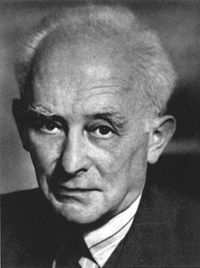Max Born
Compiled by Amira Abadir (aabadir3) on 12/1/2015

Max Born (1882-1970) was a Nobel Prize-winning physicist best known for his study of subatomic particles and contributions to quantum mechanics.
Biography
Max Born was born in Breslau, Germany (now Wroclaw, Poland) on December 11th, 1882 to Gustav Born, a professor in anatomy and embryology, and his wife Margarete. He gained his primary education in Breslau and continued his studies at the Universities of Breslau, Heidelberg, Zurich, and Göttingen, receiving his doctorate at the latter in 1907. From there he worked briefly at Cambridge, before returning to Germany in 1909. In 1913, Born married Hedwig Ehrenberg, and they had three children. Born joined the German Armed Forces due to World War I in 1915, before returning to academia in 1919.
Despite being Lutheran by faith, Born was considered to be "Jewish by heredity" and was forced to flee Germany in 1933 when the Nazis took power. He emigrated to England and became a citizen there in 1939. Born went on to spend his later career at the University of Edinburgh until winning the Nobel Prize in Physics in 1954.
Born historically had a long-running debate with his friend Albert Einstein centered around the quantum nature of the universe. The two exchanged several letters about the subject over the years, with Born arguing for indeterminism, the idea that even systems obeying precise laws are capable of sometimes behaving randomly, and Einstein arguing the opposite.
Born died on January 5, 1970 in Göttingen, Germany.
Scientific Contributions
Born created many of his most significant scientific contributions while serving as professor at the University of Göttingen from 1921 to 1933.
Matrix Mechanics
With the help of his assistants Werner Heisenberg and Pascual Jordan, Born published investigations on the principles of quantum mechanics. In 1925, Born and Heisenberg formulated the matrix mechanics representation of quantum mechanics. When Heisenberg initially presented Born with a paper that formulated quantum theory, Born recognized that these findings could be extended to apply to matrices, which had previously rarely been used in physics. With the later help of Jordan, the three physicists were able to formulate the following equation:
where q and p are matrices for location and momentum respectively, h is Planck's constant, and I is the identity matrix.
Probability Density
Born later moved on to completing his own studies on the statistical interpretation of quantum mechanics. In 1926, Born published a clarification of the probability density function in Erwin Schrödinger's equation of quantum mechanics, formulating the version of the function that is now standard. Previous research had shown that in some circumstances light and electrons behaved as waves whereas in others they acted like particles. While Schrödinger, who developed wave mechanics, interpreted particles as "wave packets", Born`s interpretation was that the particles exist but are "guided" by a wave. Born's idea was based in indeterminism, meaning that the actions of the light, electrons, etc. depend on probability and cannot always be definitely predicted. Born famously disagreed on this subject with Albert Einstein, though Born's proposition has become more popular over time.
Other Information
Awards
- As a PhD studnet at the University of Göttingen, Born was awarded the Prize of the Philosophical Faculty in 1906.
- Born was awarded the Stokes Medal of Cambridge 1934.
- Born was awarded the Nobel Prize in Physics in 1954, along with Walther Bothe.
Fun Facts
- While Born worked at the University of Frankfurt-on-Main, his assistant was Otto Stern, and the work that Stern started there led to him also earning a Nobel Prize in Physics in 1943.
- Born has a lunar crater named after him.
- Born is the maternal grandfather of actress and singer Olivia Newton-John.
Connectedness
- How is this topic connected to something that you are interested in?
- Besides being a topic that we recently discussed in class, quantum mechanics is a subject I am fascinated in. Also being a history nerd, I like knowing more about the people who discover important innovations.
- How is it connected to your major?
- As a mechanical engineering major, it does not have much to do with my field of study, but I still find it interesting.
- Is there an interesting industrial application?
- Further understanding of quantum mechanics has led to several innovations in products such as the LED and the laser.
See also
Further reading
- "The Statistical Nature of Quantum Mechanics" (Nobel Lecture) by Max Born, 1954
- Albert Einstein
- The Born-Einstein Letters by Albert Einstein and Max Born, 1971